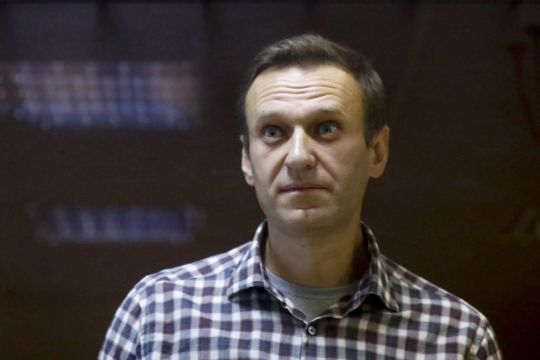Russian opposition leader Alexei Navalny, who is in the third week of a hunger strike behind bars, has been moved to hospital in another prison after his doctor said he could be near death, his lawyer said.
Mr Navalny was transferred on Sunday from a penal colony east of Moscow to a prison hospital in Vladimir, 110 miles east of the capital, lawyer Alexei Liptser said after visiting the politician on Monday afternoon.
“Yesterday he was really unwell. Given the test results and the overall state of his health, it was decided to transfer him here. In the evening, he became significantly worse,” Mr Liptser said.
Mr Navalny was able to meet him on Monday, but continued his hunger strike and “in general his look indicates he is really unwell”, the lawyer added.
Russia’s state penitentiary service FSIN did not report the decision to transfer Mr Navalny until Monday morning and a statement it released said he had agreed to take vitamin therapy.

Mr Liptser said he did not have enough time with his client to confirm that: “They were searching him ahead of our meeting longer than our meeting had lasted. He was outraged by this. Therefore, we couldn’t discuss anything, apart from what has happened to him.”
The prison service statement said Mr Navalny’s condition was deemed “satisfactory”, but his physician, Dr Yaroslav Ashikhmin, said on Saturday that test results provided by the family showed Mr Navalny had sharply elevated levels of potassium, which can bring on cardiac arrest, as well as heightened creatinine levels that indicate impaired kidney function.
“Our patient could die at any moment,” he said in a Facebook post.
Reports about his rapidly declining health drew international outrage and calls urging Russian authorities to give adequate medical help to Mr Navalny, who is President Vladimir Putin’s fiercest opponent.
European Union foreign ministers were assessing the bloc’s strategy toward Russia after the news.
Mr Navalny was arrested in January on his return from Germany, where he had spent five months recovering from a nerve agent poisoning he blames on the Kremlin — an accusation Russian officials have rejected.

His arrest triggered massive protests across Russia, the biggest show of defiance in recent years. Soon after, a court ordered him to serve two and a half years in prison for a 2014 embezzlement conviction that the European Court of Human Rights deemed to be “arbitrary and manifestly unreasonable”.
Mr Navalny began a hunger strike to protest against the refusal to let his doctors visit when he began experiencing severe back pain and a loss of feeling in his legs. The penitentiary service has said he was getting all the medical help he needed.
In response to the news about Mr Navalny’s health, his team has called for a nationwide rally on Wednesday, the day Mr Putin is scheduled to deliver his annual state of the nation address.
According to a website dedicated to the protests, demonstrations are being planned in at least 77 Russian cities.
The Interior Ministry urged Russians not to take part in unauthorised rallies, citing coronavirus risks and alleging that some “destructive-minded” participants might provoke unrest.
Kremlin spokesman Dmitry Peskov said police will treat any unauthorised protests as illegal. In the past, security forces have violently broken up demonstrations.
Russian authorities have already taken their crackdown on Mr Navalny’s allies and supporters to a new level, with the Moscow prosecutor’s office last week petitioning a court to label as extremist groups Mr Navalny’s Foundation for Fighting Corruption and his network of regional offices.







